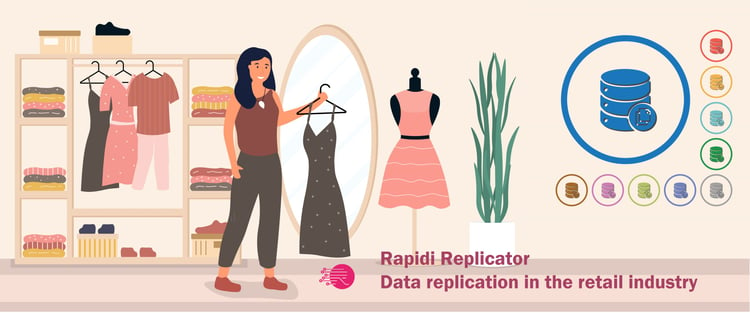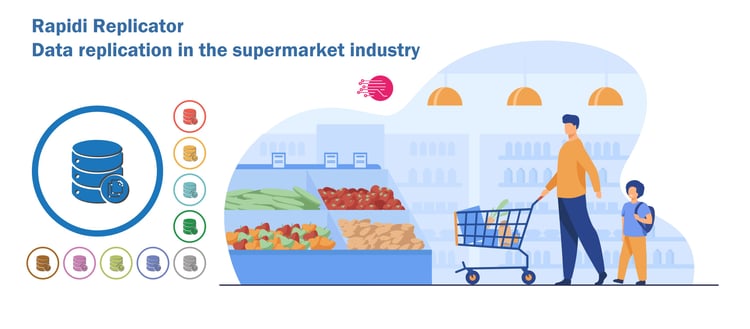Successful businesses all have one thing in common: they function and make informed decisions based on accurate, real-time data.
Data is typically derived from various sources, often across geographical locations and vast networks. This means that access to real-time, high-quality data can be a challenge. For a retail chain in a distributed environment, you might have hundreds of distributors or stores in various locations from which to manage data.
If each store has its own ERP database, you need to move and consolidate data between them and your headquarters. This consolidation of data is crucial to the success of your business.
In this article, we investigate why and how the retail industry can greatly benefit from a data replication solution. We also showcase how a supermarket chain has implemented the Rapidi Replicator solution to solve its data replication challenges and improve business performance.
What is data replication?
Data replication is the process of creating and maintaining multiple copies of the same data in various locations as a way of ensuring data availability, reliability and resilience across an organisation.
Simply put, it means replicating the same data from a database from one server to another. The purpose is to share data between users and avoid data loss, data redundancy and data inconsistencies.

Different types of data replication
There are many different types of data replication, for example:
- Database Replication: The general term for copying and maintaining data consistency between multiple databases.
- Snapshot Replication: Sends a complete copy of the data to subscriber databases at a specific point in time.
- Transactional Replication: Continuously sends data changes (inserts, updates, deletes) from the publisher to subscribers.
- Full Table Replication: Replicates all data in a table, regardless of changes, during each update.
- Merge Replication: Allows updates on both publisher and subscriber databases.
- Partial Replication: Replicates only specific subsets of data (tables, columns, rows) based on filters.
Each can be processed in real-time or not, depending on the requirement.
Why should we use data replication?
With data replication, you can effortlessly create real-time or updated backups, ensuring your information is secure and readily available. It enables seamless collaboration and well-informed decision-making by fostering geographically dispersed data access, regardless of location.
Data replication also paves the way for scalability. As your business grows, your data storage needs can easily be met. With a simple integration into your existing setup, you can effortlessly handle increased data volumes without risking data loss.
The distribution of data across multiple servers means faster response times and improved efficiency. Your systems will run like clockwork, empowering you to make the most out of your valuable resources.
Recently, companies have collected ever-growing amounts of data. In every industry, data management has become an absolute priority for securing high-quality, consistent data, a must for any business looking to streamline its processes and employ informed decisions across departments.
Data replication in the retail industry
This is especially true for companies that evolve in distributed computing environments. A good example of this is within the retail industry, where companies have a headquarters and a series of points of sales in varying locations, oftentimes in multiple countries.
This is an example of a distributed systems environment. For example, a retailer could use Dynamics 365 Business Central locally in their shops or point of sale (POS), or a Microsoft SQL-based POS system. To run their business effectively, these systems need to exchange consolidated, real-time data between their stores and their headquarters.
For example, having updated data about products and pricing is vital for the smooth running of every store under one retail chain, regardless of the location. This type of information is typically decided and controlled at the headquarters level. It’s registered in a central system but should be available for multiple users in all stores and POS.
In parallel, all sales and employee data must be transferred from each department store or POS to headquarters. It is imperative that the data is replicated reliably and seamlessly between the stores and a central server.
Want to see for yourself how the replicator for Microsoft Dynamic NAV synchronizes data for Rema 1000 in no time?
Download the case study to find out.
Connect your central Microsoft Dynamics with other Microsoft Dynamics databases
The Rapidi Replicator for Microsoft Dynamics is the perfect solution for companies, enabling seamless synchronisation across multiple Microsoft databases.
The Rapidi Replicator can replicate any data across Dynamics 365 Business Central, Microsoft Dynamics 365 Finance, Microsoft Dynamics 365 Finance and Operations systems or databases independent of the product version.
It also works with earlier versions of Microsoft Dynamics, such as Microsoft Dynamics NAV and Microsoft Dynamics AX. It works whether the company uses the c/side (native) database or an MS-SQL database.

Practical use cases and examples of data replication
Below we'll explore 2 use cases of data replication: In the retail industry and hotel industry.
The Rapidi Replicator for the retail industry

The Rapidi Replicator is ideal for use as a data replication solution in the retail industry and has helped many companies. For example, REMA 1000, a multinational discount supermarket chain, has used and is still using the Rapidi Replicator for Microsoft Dynamics 365 Business Central to move data between over 400 stores and their headquarters. As a result, they are improving business processes and sales routines throughout their discount supermarket chain.
The Rapidi Replicator solution ensures that any relevant information is smoothly and automatically exchanged from the stores to the headquarters.
Information about products, prices, and purchase orders is replicated from the headquarters to the stores. Employee data is transferred from each single store to the headquarters.
The benefits of data replication in the retail industry
After implementing the Rapidi Replicator, REMA 1000 quickly experienced tangible benefits, including:
- Elimination of double data entries
- Real-time data
- Better overview of the complete data
- Time and cost-saving
- Improvement of general work routines
The Rapidi Replicator is a very good match for the retail industry, as well as various other business chains. The Rapidi Replication Solution is completely scalable, providing reliable results over multiple locations without the need for further purchases from Microsoft Dynamics.
Data replication in the hotel industry

The same applies to hotel chains, which oftentimes have very similar setups.
Contact our experts to find out more about how Rapidi Replicator can boost your business.
FREQUENTLY ASKED QUESTIONS














